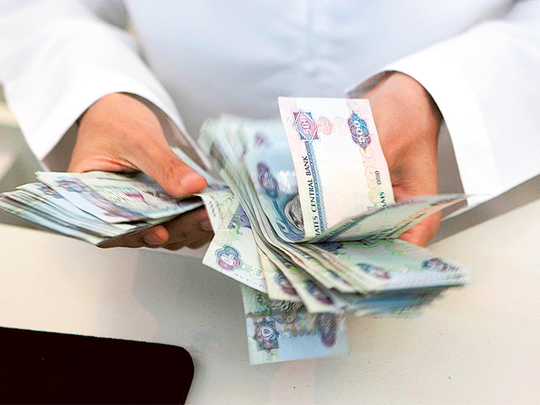
Abu Dhabi: To help Emiratis avoid debt and financial strain, a UAE-based organisation, Baizat, has helped educate thousands of Emiratis on responsible financial planning and spending.
At least 70 per cent of young Emiratis are in debt, according to a study carried out by Mckinsey & Company in 2011, highlighting the need for financial awareness.
“Our organisation was established due to a lack of financial education in this part of the world. Personal household debt in the UAE is very high, so it was important to have an institution that would educate and teach people on how to properly use their money,” said Salah Al Halyan, managing director of Baizat.
Baizat recently announced its partnership with Emirates Foundation’s new Esref Sah 100 Youth Club programme, which will see 100 Emirati youth trained and educated on financial awareness.
The Emirates Foundation is an independent philanthropic organisation set up by the government of the emirate of Abu Dhabi to facilitate public-private funded initiatives to improve the welfare of the youth across the UAE.
Maham Tarar, senior programme developer, Social Inclusion, Emirates Foundation, told Gulf News about the new joint project involving Baizat. “The course will be implemented through a group of selected individuals from corporations, government entities, colleges and other educational institutions. The training period will last for three months after which the Youth Club members will be certified financial planners. They can then deliver workshops within their own community, among their own clients and customers, and among their peer group.
“High-performing members will then be selected to become financial consultants, which will involve further training and mentoring sessions in order to ensure that they are well equipped with the required tools and knowledge,” Tarar added.
Al Halyan told Gulf News that consumerism was largely to blame for the issue of overspending and debt. “Forty years ago, people had different ideas and concepts. Before the oil, people depended on themselves, they worked hard and they didn’t waste things like water and food which were seen as precious commodities.
“Nowadays, people are spending so much money and they’re also pushed to keep spending more on many different brands, and when someone keeps doing this it will cost them later on. This is what it comes down to.”
Al Halyan emphasised that this is not just happening here but also all over the world. “People are spending beyond their means so they can have a lavish lifestyle,” he added.
As part of the company’s educational programmes, seminars and workshops are held across the country to educate as many Emiratis as possible.
“We teach students the value of money, where money comes from, and what to do with it,” Al Halyan said.
“Other economic concepts we talk about are budgeting, saving, and investing. We teach the students about credit and debt, how to borrow money smartly, and how they can plan for the future,” he continued.
Al Halyan also explained that some of the seminars carried out by Baizat are made interactive so that participants can get involved as much as possible, “During sessions we give keypads for question and answer sessions,” he said.
“It’s a mind-changing process, people come in and go out thinking differently because concepts and ideas start to change, and they see life differently. Many people who have come out of our programme have told us they have felt more comfortable afterwards on issues like money,” he added.
Al Halyan added that it was important to have financial consultants available to provide sound financial guidance. “We get people telling us that they need help and are looking for a source to assist them. In the UAE, we don’t have enough financial consultants compared to countries in the West, which have thousands of financial consultants,” he said.
Adding value to your money
Essentially, money comes from two sources of income: Work (salary) and investments. We work for our money and we can put our money to work.
Investment is employing money to work for you, but in order to do that you must save so you can invest safely. Saving in general is important so you don’t lose resources, acquire assets and have more income.
If you don’t save and invest, you may end up depending on only one source of income (your salary), which leaves you in a precarious position.
In addition — as you get older — with no assets or investment, you may struggle to adjust to living on a reduced income.
Pensions are typically only 70 per cent of your last income, so for people retiring without any additional savings/investments, retiring may have a significant effect on their standard of life.
Top business executives from Abu Dhabi’s INSEAD Business School graduate programme share their best practices.
Sedef Gunsur, executive director, National Bank of Abu Dhabi
“We are privileged enough to live in a wealth-abundant country, but we have seen in the past that no region is fully immune to market volatility and it is always a good idea to be ready for whatever life might bring.
“Decisions between spending and saving is a constant challenge for me, therefore, I try to discipline myself and not have access to cash in my bank account. Despite all the attractive offers, I only have one credit card. Although there are awards on the credit card, I still prefer to use my debit card to monitor my day-to-day cash flow better,” she said.
“I strongly recommend young people start saving early on, form a saving habit and stay away from multiple credit cards and personal loans. If they find it hard, they should also not shy away from getting a financial planner to help them stay on track,” she said.
“I graduated from university with debts and, subsequently, spent a number of years paying these off. This experience has made me very cautious of taking on debt, especially in situations where I know that it is not to pay for a necessity.
“I have a broad outline detailing income and expected expenses for the year ahead. This gives me a basic understanding of what kind of room I have available to spend, but also helps me identify potential concerns, when I decide I want to buy a Ferrari at the end of the year.
“I also minimise impulse buying, except on special occasions. In the past I have really suffered from impulse buys, especially when the items were expensive items.
“Debt in itself is not a bad or evil thing. The risk is when one is not fully aware of his financial responsibilities and then overexposes himself with debt to a point that he is financially distressed. Having a well-planned debt with clear repayment plans, buffer for contingencies and adequate assets to cover it may well be a wise decision.
“I wish to caution that one should not overdo on savings that start impacting the present. It is important to have a balance in identifying the present and future financial needs in line with one’s current and future income potential, else you will stop enjoying the present in a bid to save everything for the future.
“I plan my saving targets annually to have a sufficient corpus to meet my key expenditure needs in the future like my daughter’s higher education, her marriage, and my retirement. So each year, I update my future key expenditures and my retirement corpus and then back calculate my current saving amounts.”
“I limit my credit repayment and cost associated with credit to a certain level, altogether to 30 per cent of revenues.”
Excerpts from the financial training programme being offered by Baizat
to young Emiratis:
How to be smart with borrowings
1. Resist the temptation: Borrowing is something that can be extremely tempting. There are plenty of deals and services in the UAE.
However, before borrowing and to ensure you borrow with good reason, always ask yourself the following questions:
Do I really need to borrow and how will it affect my life in the long term? For example, if you take a two-year loan to refurbish the house, how will you feel in one-and-a-half-year’s time when you are still paying off the loan? Make sure you can answer, ‘Yes, it will still be worth it at the time’ with confidence.
2. Are you borrowing for a short-term want (for example, a personal loan for a vacation) or a long-term need (a student loan, a mortgage for a new house)? If it’s a short-term want, consider saving in advance or looking for a more affordable option.
If its a long-term need, take your time with the decision. Think carefully about how it will affect your life and do not make rash decisions.
3. Do you already owe money and are you in control of your existing payments? Aim not to borrow more than 30 per cent of your yearly net income.
4. How will borrowing affect your budget and current expenses? Be sure you can afford the payments now and in the future and can still live comfortably, save and prepare for emergencies.
5. What are the charges and fees at different banks? Did you shop around for rates? What are the consequences if you do not make your payments? Make sure to read all terms and conditions at the bank before agreeing to sign the contract.







